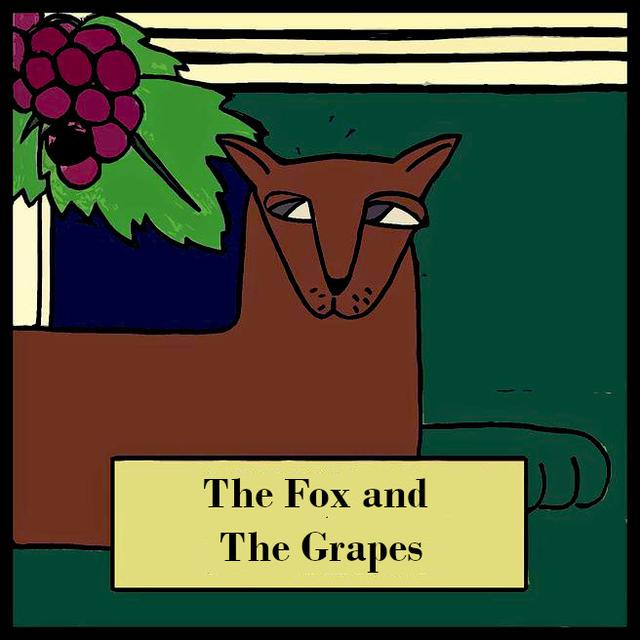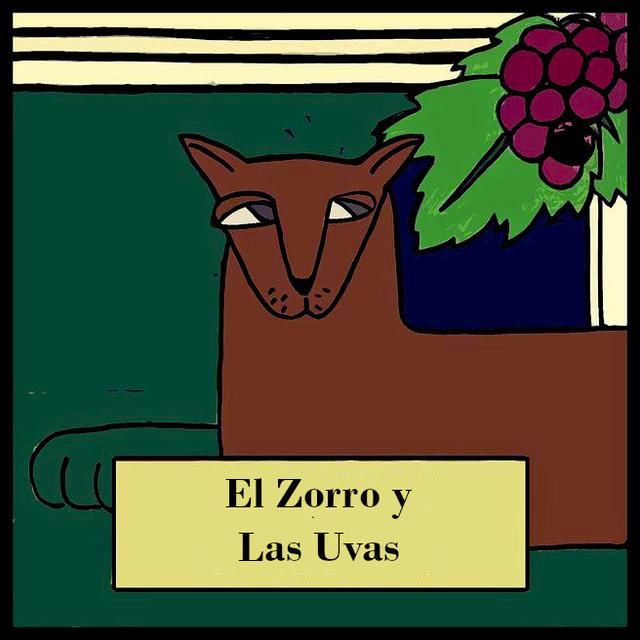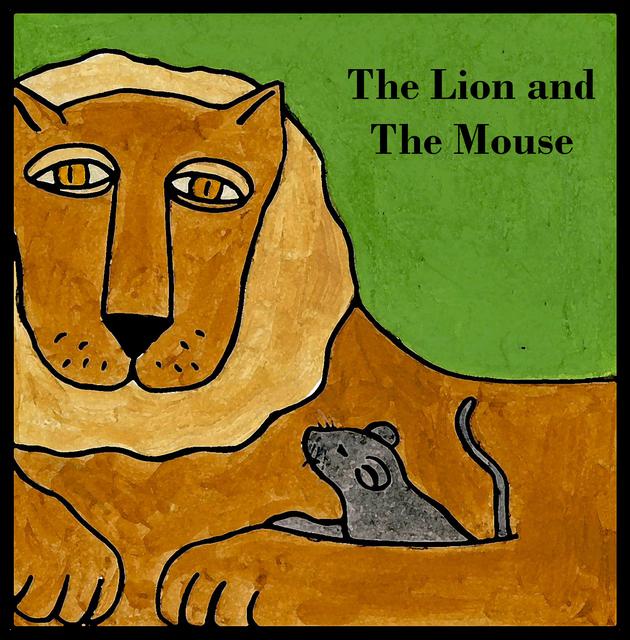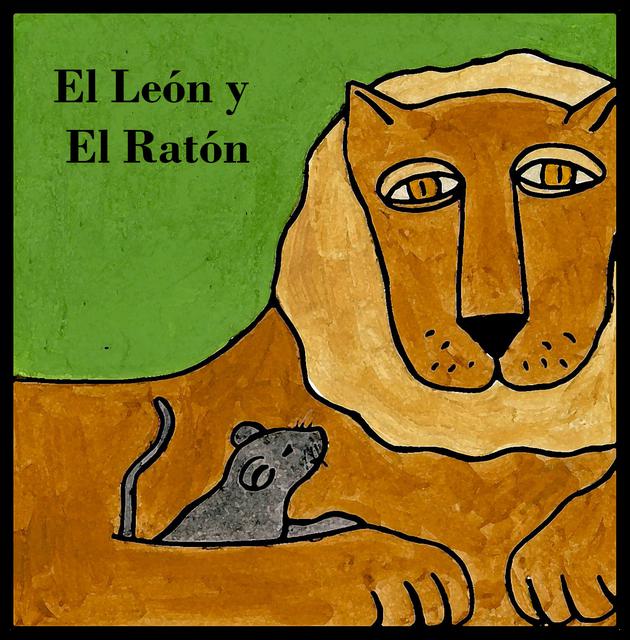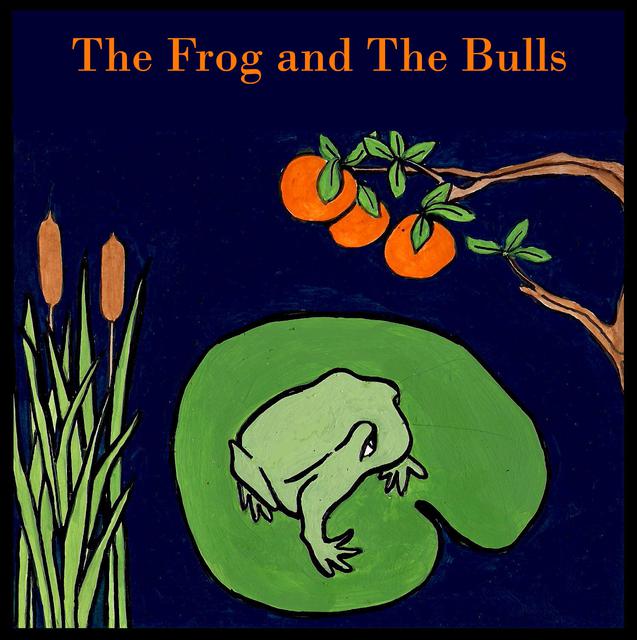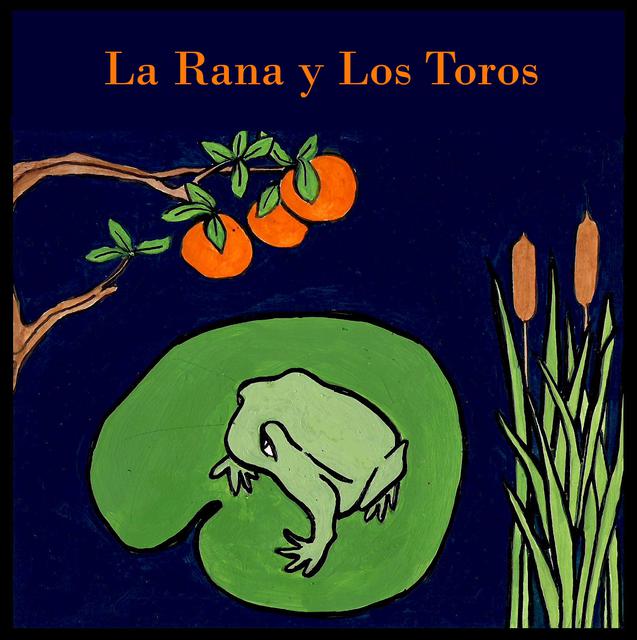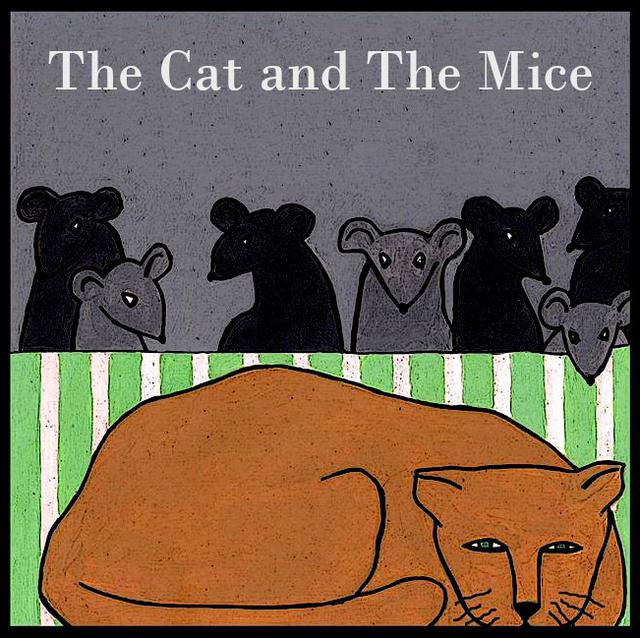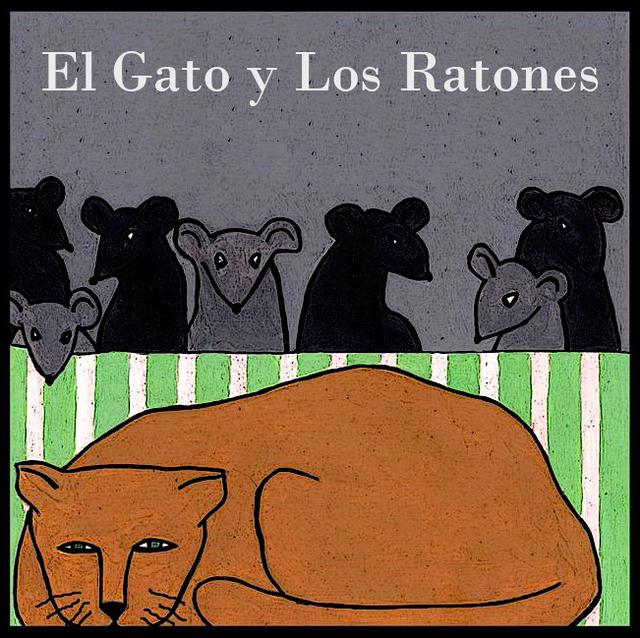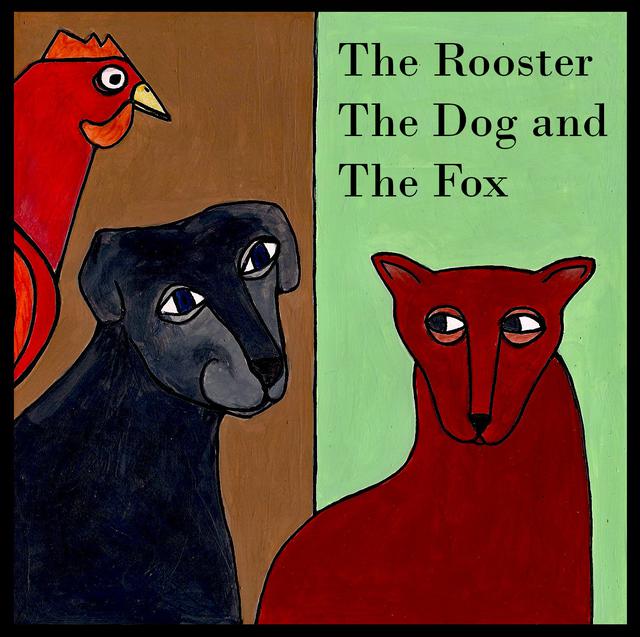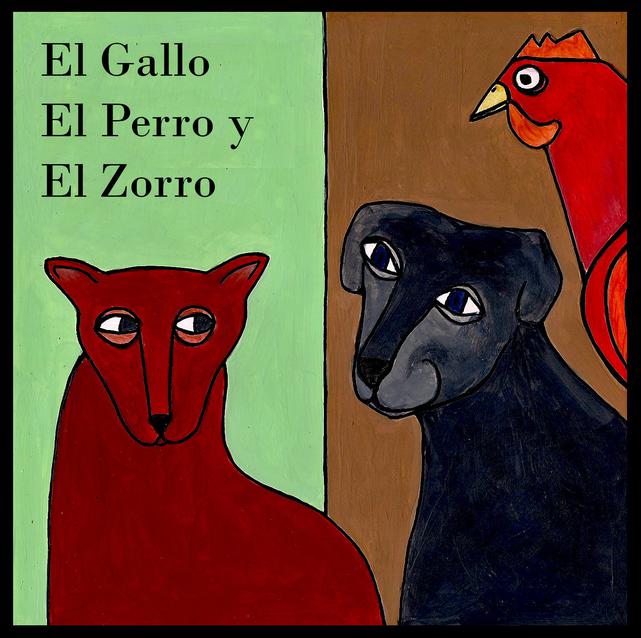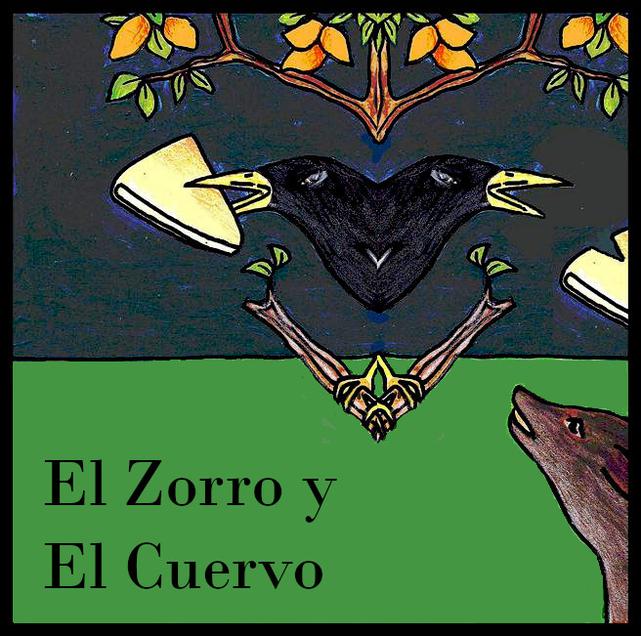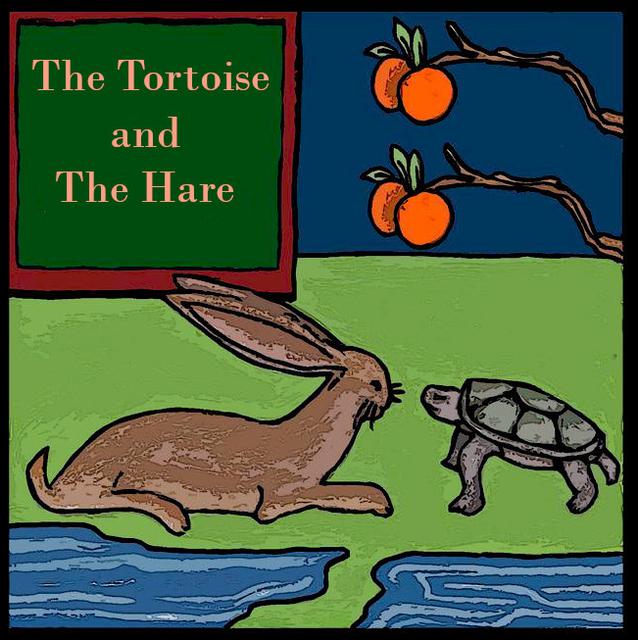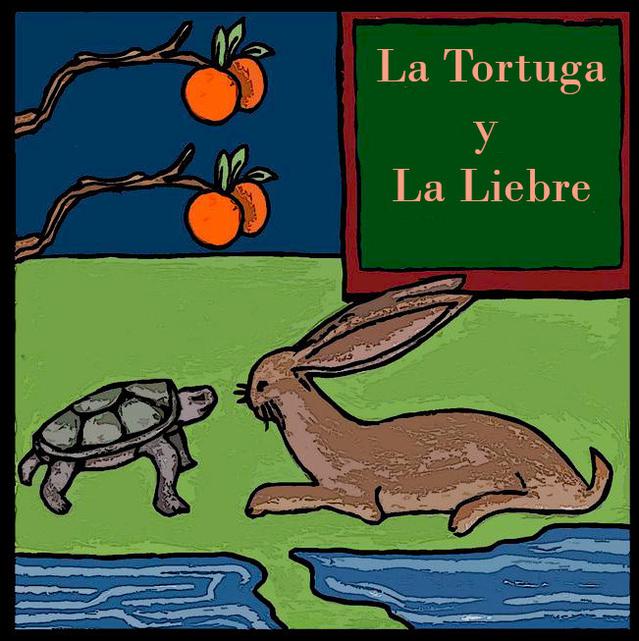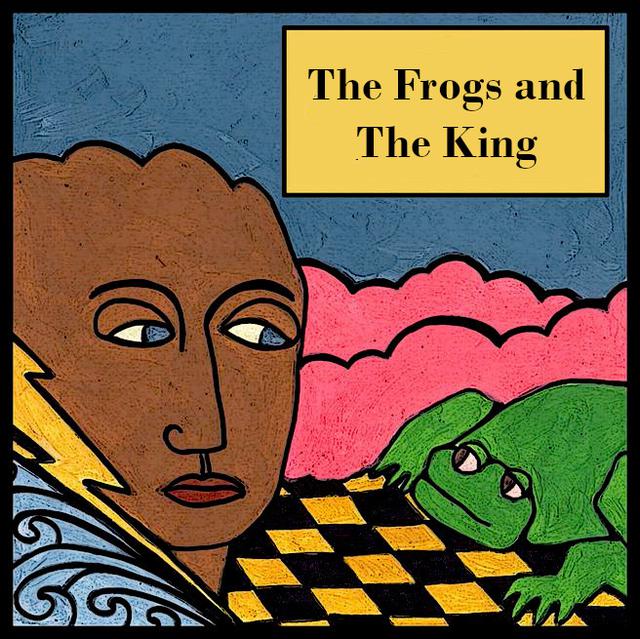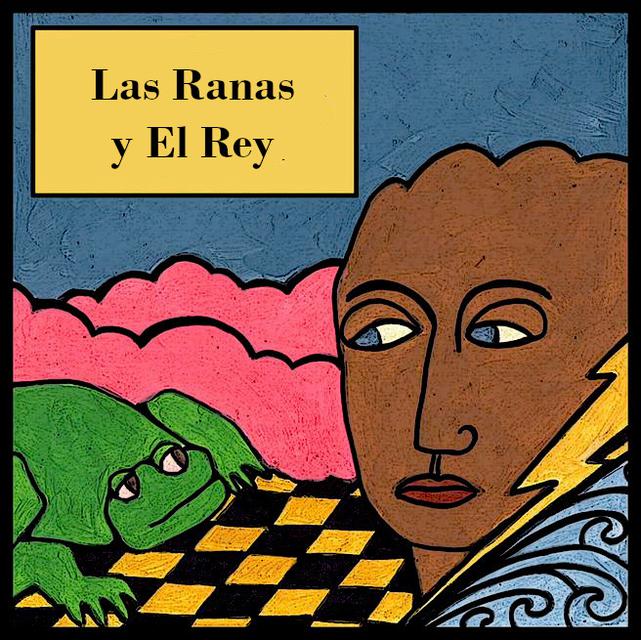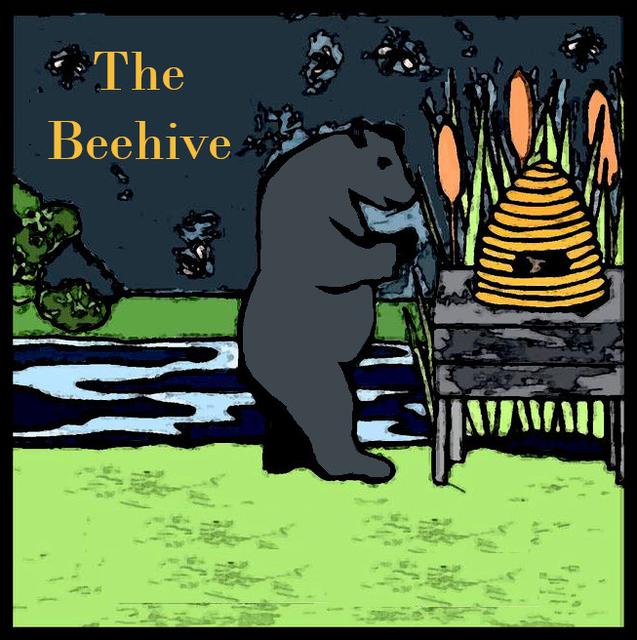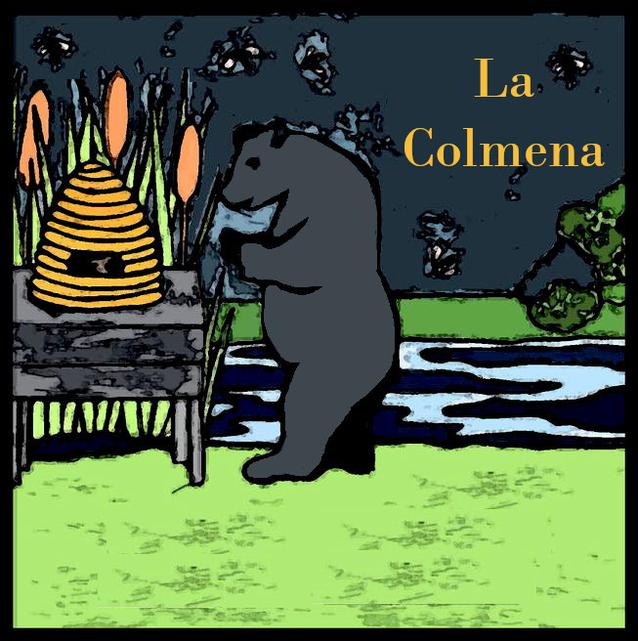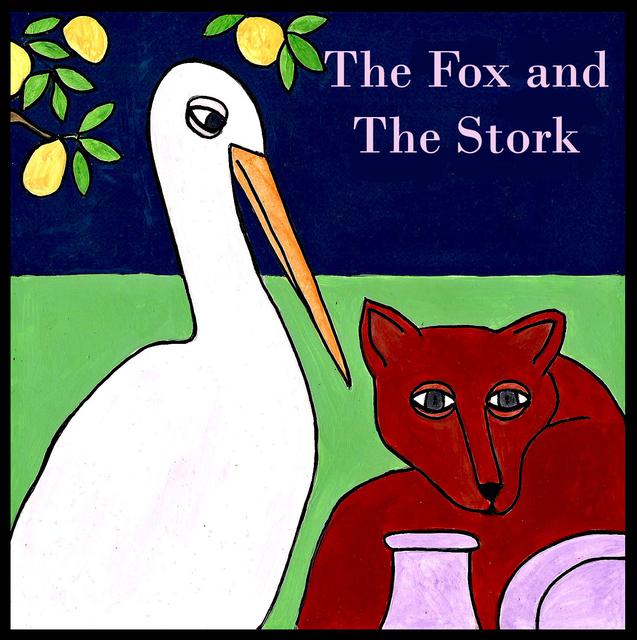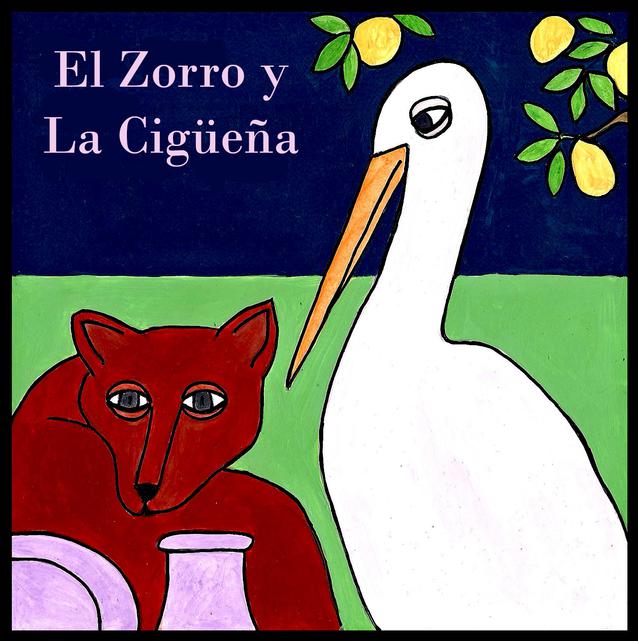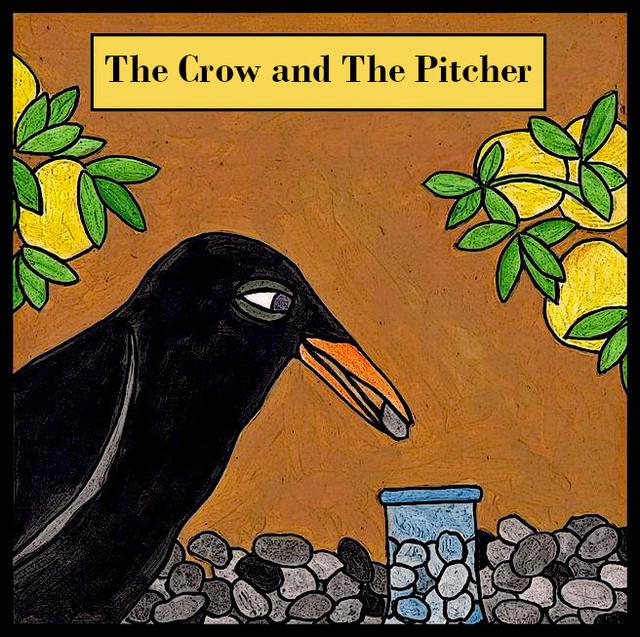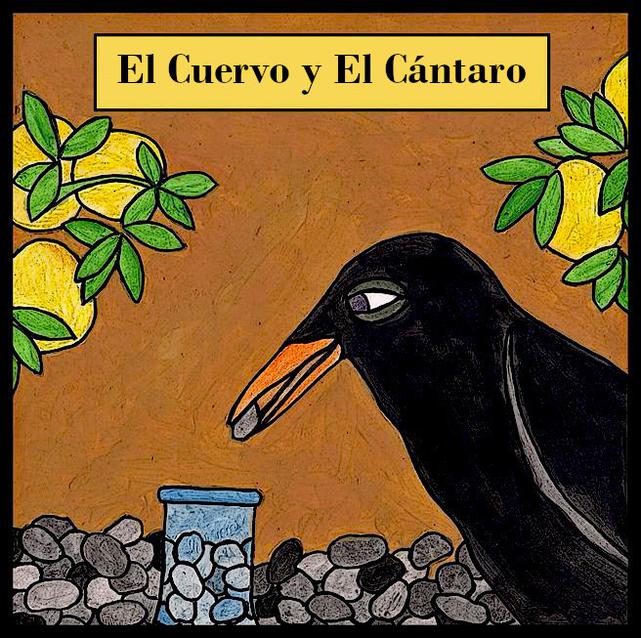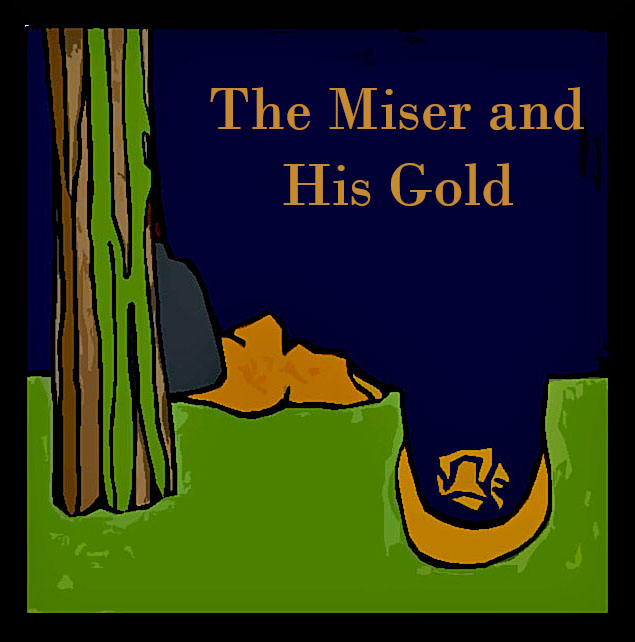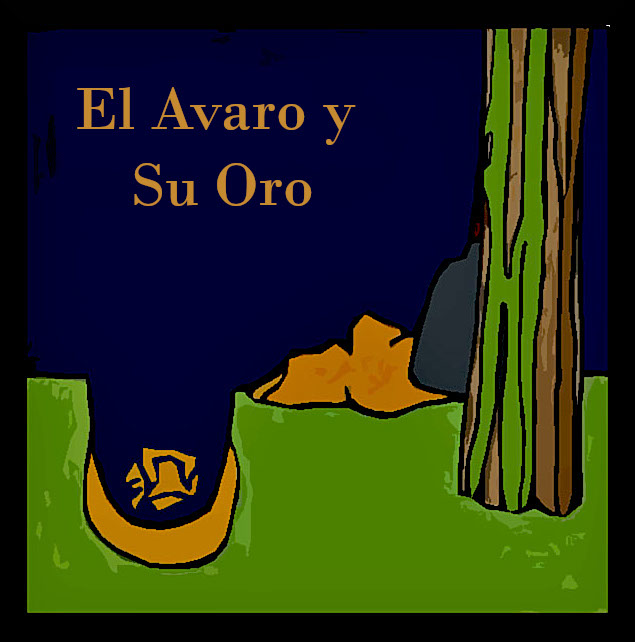AESOP - ESOPO
Twelve stories in English-Español
Twelve stories inspired by
Aesop's Fables
Aesop, born two thousand six hundred years ago, was friends with the Seven Sages in Greece who advanced the idea that men, and not the gods, were responsible for their actions. The novel concept of personal responsibility did not please the priests who exploited superstition to stay in power.
So as not to offend his audience and to avoid censorship Aesop, for the most part, used animals in his fables. Each animal is identified with a particular human trait - the cunning fox - borrowed from Egyptian mythology.
CHAPTER ONE
ONE - The Fox and The Grapes
TWO - The Lion and The Mouse
THREE - The Frog and The Bulls
FOUR - The Cat and The Mice
FIVE - The Rooster, The Dog and The Fox
SIX - The Fox and The Crow
SEVEN - The Tortoise and The Hare
EIGHT - The Frogs and The King
NEW - The Beehive
TEN - The Fox and The Stork
ELEVEN - The Crow and The Pitcher
TWELVE - The Miser and His Gold
CHAPTER TWO
Dialogues in eight acts
Perfect for a classroom, with enough roles for each student. For a play, younger students can be the Ants in the Prologue, and the timid can be Narrators or the Moralists.
The stories are written in the present tense, and I encourage my students to place them in the past and future tenses.
Ideas for sets and accessories: www.alphainkeditions.info
Doce Historias inspiradas en las Fábulas de Esopo
Esopo, nacido hace dos mil seiscientos años, era amigo de los Siete Sabios de Grecia, quienes propusieron la idea de que los hombres, y no los dioses, eran los responsables de sus actos. El novedoso concepto de responsabilidad personal no agradó a los sacerdotes, quienes explotaron la superstición para mantenerse en el poder.
Para no ofender a su audiencia y evitar la censura Esopo utilizó, en su mayor parte, animales en sus fábulas. Cada animal se identifica con un rasgo humano particular - el zorro astuto - tomado de la mitología egipcia.
CAPÍTULO UNO
UNO - El Zorro y Las Uvas
DOS - El León y El Ratón
TRES - La Rana y Los Toros
CUATRO - El Gato y Los Ratones
CINCO - El Gallo, El Perro y El Zorro
SEIS - El Zorro y El Cuervo
SIETE - La Tortuga y La Liebre
OCHO - Las Ranas y El Rey
NUEVO - La Colmena
DIEZ - El Zorro y La Cigüeña
ONCE - El Cuervo y El Cántaro
DOCE - El Avaro y Su Oro
CAPÍTULO DOS
Diálogos en ocho actos
Perfecto para una clase, con suficientes papeles para cada alumno. Para una obra de teatro, los alumnos más jóvenes pueden ser las Hormigas en el Prólogo, y los tímidos los Narradores o los Moralistas.
Las historias están escritas en presente, y animo a mis alumnos a situarlas en pasado y futuro.
Ideas para decorados y accesorios: www.alphainkeditions.info
ONE
UNO
Fox is tired, grumpy, hot, hungry, and thirsty. All day looking for work, his morale is at an all-time low.
He sits on a bench to rest in the shade, opens the newspaper to the "Classified Ads" section and finds nothing of interest. He puts the newspaper down, wipes his face with a handkerchief, loosens his tie and leans his head back for a nap.
That's when he sees the grapes hanging over his head.
“Look at that, big juicy grapes, hanging over my head.”
He stands on the bench and tries to reach the grapes with his newspaper, but they are too far. He puts the newspaper down, steps back a few paces and jumps as high as he can.
No good.
He backs up a bit more, runs, and jumps even higher… What a waste of time!
Zorro está cansado, gruñón, acalorado, hambriento, y sediento. Todo el día buscando trabajo, su moral está en su punto más bajo.
Se sienta en un banco para descansar a la sombra, abre el periódico en la sección de “Anuncios Clasificados” y no encuentra nada de interés. Deja el periódico, se seca la cara con un pañuelo, se afloja la corbata y echa la cabeza hacia atrás para echarse una siesta.
Entonces es cuando ve las uvas colgando sobre su cabeza.
“Mira eso, uvas grandes y jugosas, colgando sobre mi cabeza.”
Se sube al banco e intenta alcanzar las uvas con su periódico, pero están demasiado lejos. Deja el periódico, retrocede unos pasos y salta lo más alto que puede.
Nada.
Retrocede un poco más, corre y salta aún más alto... ¡Qué pérdida de tiempo!
Fox is so occupied he doesn't see Bunny passing on her way to market. She stops to observe him jumping around like a fool.
She looks at her watch, sits down, crosses her legs, sips her cappuccino, picks up the newspaper and starts to read. She raises her head to gaze at Fox who is becoming more frustrated every minute, not to say extremely tired. He is about to kick the vine when...
“What is it, honey? Trouble reaching the grapes? They look quite delicious.” Really Bunny is having too much fun watching him cavort.
Slowly Fox puts his foot down, sits, takes out his handkerchief, wipes his face and closes his eyes. This bunny talks too much.
“They are not yet ripe.”
“Really? From here they look nice and juicy. Try one more time. If you want, I’ll help and we can share.”
Fox thinks he's smart, plus he doesn't like to share.
“I tell you they’re not ripe and I will not stay here to discuss this any longer. I have an appointment.”
“You mustn’t miss your appointment,” says Bunny. “Good luck!”
Zorro está tan absorto que no ve pasar Conejita de camino al mercado. Ella se detiene para observarlo saltando como un tonto.
Mira su reloj, se sienta, cruza las piernas, toma un sorbo de su capuchino, coge el periódico y empieza a leer. Levanta la cabeza para mirar a Zorro que cada minuto se siente más frustrado, por no decir extremadamente cansado. Está a punto de patear la vid cuando...
“¿Qué pasa, cariño? ¿Problemas para alcanzar las uvas? Se ven bastante deliciosas.” Realmente Conejita se está divirtiendo mucho viéndolo hacer cabriolas.
Lentamente Zorro baja el pie, se sienta, saca el pañuelo, se limpia la cara y cierra los ojos. Este conejita habla demasiado.
“Aún no están maduras.”
“¿En serio? Desde aquí se ven bonitos y jugosos. Intenta una vez más. Si quieres, te ayudo y podemos compartir.”
Zorro cree que es inteligente, además, no le gusta compartir.
“Te digo que no están maduros y no me quedaré aquí para discutir esto por más tiempo. Tengo una cita.”
“No debes faltar a tu cita,” dice Conejita. “¡Buena suerte!”
Fox leaves, still thirsty followed by the cloud of defeat. Once he’s gone Bunny grabs the vine, gives it a good tug, and the grapes fall directly into her hands.
Fox, having forgotten his newspaper, retraces his steps and sees Bunny with the grapes.
“They’re mine!” he shouts.
“How’s that?” Bunny asks. “What did you just say? Not ripe? Good day, my friend.”
Fox sits down and puts his head in his hands. It's not a good day at all.
Moral
Do not belittle what you cannot achieve.
Sometimes it’s better to share, rather than end with nothing at all!
Zorro se va, todavía sediento y seguido por la nube de la derrota. Una vez que se va, Conejita agarra la vid, le da un buen tirón y las uvas caen directamente en sus manos.
Zorro, habiendo olvidado su periódico, vuelve sobre sus pasos y ve a Conejita con las uvas.
“¡Son mías!” el grita.
“¿Cómo es eso?” Conejita pregunta. ¿Qué te escuché decir? ¿No maduras? Buenos días, mi amigo.”
Zorro se sienta y pone su cabeza entre sus manos. No es un buen día en absoluto.
Moralidad
No menosprecies lo que no puedes lograr.
¡A veces es mejor compartir que terminar sin nada!
DOS
TWO
Mouse is having a grand time chasing King Leo’s tail, though she knows it’s dangerous. However, he is getting older and she can’t help teasing him. The old lion is fairly laid back, for a king but Mouse is getting on his nerves.
The more he’s nervous the more his tail switches, and the more his tail switches the more Mouse has fun chasing it. Finally, with one quick swipe, Leo catches her with his huge paw.
“So sorry, so sorry! I promise I won’t chase your tail any more, please let me go!”
The king looks at the small scared animal. As if it were that easy! He has a reputation to uphold. If word gets out that he let her go it would be seen as a weakness. Who would respect him then?
“I don’t think so.”
“Please,” begs Mouse. “Give me my freedom and one day I will return the favor.”
Ratón se lo está pasando en grande persiguiendo la cola del Rey Leo, aunque sabe que es peligroso. Sin embargo, él se está haciendo mayor y ella no puede evitar burlarse de él. El viejo león es bastante relajado, para ser un rey, pero Ratón lo está poniendo nervioso.
Cuanto más nervioso está, más mueve su cola, y cuanto más la mueve, más Ratón se divierte persiguiéndola. Finalmente, con un golpe rápido, Leo la atrapa con su enorme pata.
“¡Lo siento, lo siento! Prometo que no perseguiré más tu cola, ¡por favor déjame ir!”
El rey mira al pequeño animal asustado. ¡Como si fuera tan fácil! Tiene una reputación que mantener. Si se corre la voz de que él la dejó ir, sería visto como una debilidad. ¿Quién lo respetaría entonces?
“No me parece.”
“Por favor,” ruega Ratón. “Dadme mi libertad y un día os devolveré el favor.”
Leo se ríe. ¿Cómo algo tan pequeño podría hacerle algún servicio?
“¿Cómo tu podrías ayudarme a mi, León, Rey y Gobernante de la Tierra? Sin embargo, tienes espíritu y te dejaré ir con una advertencia. Mantente alejado, no vuelvas a acercarte a mí o la próxima vez no tendrás tanta suerte.”
“¡Prometo! ¡Nunca más!”
“Y una cosa más... no se lo digas a nadie.”
Ratón está de acuerdo, el asunto se resuelve y la vida continúa como de costumbre hasta que una mañana Leo cae en una red camuflado en un grupo de árboles. Cuanto más trata de liberarse, más se enreda. No hay nada que pueda hacer excepto esperar a los cazadores. Oscuros pensamientos entran en su cabeza, de lo que le sucederá.
“Esto no es bueno. No es bueno en absoluto.”
Ratón cumple su promesa. Casi. Ella nunca molesta al rey, pero lo controla de vez en cuando desde la distancia. Hoy no puede encontrarlo en los lugares habituales, y cuando lo encuentra finge no darse cuenta de que Leo está atrapado en la red.
Podemos imaginar lo difícil que es para un rey pedir ayuda.
“¡Uhum!” dice Leo, en voz alta, fingiendo carraspear.
Ratón finge no escucharlo.
“¡U-HUM!”
Ella se detiene.
“Buenos días Su Majestad. Hace buen tiempo, ¿verdad?”
“Seguramente. Un poco de frío por las mañanas, pero en general no podemos quejarnos.”
Leo laughs. How could something so small do him any service?
“How could you ever help me, Lion, King and Ruler of the Land? However, you have spirit and I’ll let you go with a warning. Stay away, don’t ever get near me again or the next time you won’t be so lucky.”
“I promise! Never again!”
“And one more thing… don’t tell anyone.”
Mouse agrees, the matter is settled and life goes on as usual until one morning Leo falls into a net camouflaged in some trees. The more he tries to free himself, the more he gets tangled. There is nothing he can do except wait for the hunters. Dark thoughts enter his head, of what will happen to him.
“This isn’t good. It’s not good at all.”
Mouse keeps her promise. Almost. She never bothers the king but checks up on him every so often from a distance. Today she can’t find him in the usual places, and when she does spot him she pretends not to notice that Leo is caught in the net.
We can imagine how hard it is for a king to ask for help.
“Uhum!” says Leo, loudly, pretending to clear his throat.
Mouse pretends not to hear him.
“U-HUM!”
She stops.
“Good morning Your Majesty. Beautiful weather, isn’t it?”
“Certainly. A bit chilly in the mornings, but altogether we can’t complain.”
“Well, I’ll be on my way. Haven’t had breakfast yet, always a good thing to start the day with a healthy breakfast.”
“Quite right,” says Leo.
“Have you had breakfast?” asks Mouse politely.
“Actually… as you may have noticed I’ve been… detained.”
“How unfortunate. Never a good thing to go hungry,” says Mouse. “Well, I won’t keep you any longer.”
“Wait. I’m… in a bit of a bind,” says Leo.
“Yes?”
“I’m thinking that maybe…”
“That maybe I can help you?”
“Yes,” says Leo, humbly. “I would appreciate your help.”
Mouse doesn’t wait for him to finish speaking. She sees the hunters in the distance pulling a cage and is already hard at work chewing on the thick rope.
Leo also sees the hunters and is terrified.
“Hurry,” he says to Mouse.
It’s slow going and her mouth starts to bleed but Mouse doesn’t stop until she makes a hole large enough for Leo to pass through. However, he is so tangled in the ropes he can’t undo himself. She frantically runs up and down pulling at the net until Leo is freed.
“Bueno, me iré. Todavía no he desayunado, siempre es bueno empezar el día con un desayuno saludable.”
“Muy cierto,” dice Leo.
“¿Usted ha almorzado?” pregunta Ratón cortésmente.
“En realidad... como habrás notado, he sido... detenido.”
“Que desafortunado. Nunca es bueno pasar hambre,” dice Ratón. "Bueno, no te retendré más.”
“Esperar. Estoy… en un aprieto,” dice Leo.
“¿Sí?"
“Estoy pensando que tal vez... ”
“¿Quizás pueda ayudarles?”
“Sí,” dice Leo con umildad.“Apreciaría tu ayuda.”
Ratón no espera a que termine de hablar. Ve a los cazadores a lo lejos tirando de una jaula y ya está trabajando duro masticando la gruesa cuerda.
Leo también ve a los cazadores y está aterrorizado.
“Date prisa,” le dice a Ratón.
Va despacio y su boca empieza a sangrar pero Mouse no se detiene hasta que hace un agujero lo suficientemente grande como para que Leo pase por él. Sin embargo, está tan enredado en las cuerdas que no puede deshacerlo. Corre frenéticamente arriba y abajo tirando de la red hasta que Leo se libera.
Just in time! The hunters see Leo escape and run towards him but he’s already at the edge of the forest. Leo stops and turns to Mouse.
“What are you waiting for? Jump on my back!”
Mouse jumps on his back and they tear their way through the trees. Once they are at a safe distance they stop near a spring of water. Leo drinks deeply and Mouse washes the blood from her mouth.
“I am forever grateful,” says the old king. “Without your help I would have been caught. What can I do to return the favor?”
“Be my friend,” says Mouse.
King Leo remembers how he thought Mouse could never help him. He picks up the tiny creature and holds her to his cheek.
“You are my friend forever,” he says.
Moral
Friends come in all sizes.
Stay alert and you won’t get caught!
¡Justo a tiempo! Los cazadores ven escapar a Leo y corren hacia él, pero ya está en el linde del bosque. Leo se detiene y se vuelve hacia Ratón.
“¿A qué esperas? ¡Salta a mi espalda!”
Ratón salta sobre su espalda y se abren passo entre los árboles. Una vez que están a una distancia segura se detienen cerca de un manantial de agua. Leo bebe profundamente y Ratón se lava la sangre de la boca.
“Estoy eternamente agradecido,” dice el anciano rey. “Sin tu ayuda me habrían atrapado. ¿Qué puedo hacer para devolver el favor?”
“Sé mi amigo,” dice Ratón.
Rey Leo recuerda cómo pensó que Ratón nunca podría ayudarlo. Recoge a la pequeña criatura y la sostiene contra su mejilla.
“Eres mi amiga para siempre,” dice.
Moralidad
Los amigos vienen en todos los tamaños.
¡Mantente alerta y no te atraparán!
THREE
TRES
A certain frog called Sanaa likes to go to the marsh in the morning to watch the sunrise. As usual she looks towards the farthest side of the marsh where the bulls gather to drink. They’re fighting. Again.
There are always skirmishes on that side, as the bulls look for the best spot near the water. Generally they calm down, but not lately.
“It seems the arguments are getting worse, and more frequent,” she says to her best friend Thelma.
“I wouldn’t worry,” replies Thelma. “They’re always bickering.”
Sanaa hopes Thelma is right. They go back every morning for a whole week and notice that each passing day the bulls are angrier. What concerns them is they are moving closer to where the frog community lives.
Cierta rana llamada Sanaa le gusta ir al pantano por la mañana para ver el amanecer. Como de costumbre, mira hacia el lado más alejado del pantano donde los toros se reúnen para beber. Se están peleando. De nuevo.
Siempre hay escaramuzas en este lado del pantano, ya que los toros buscan el mejor sitio cerca del agua. Normalmente se calman, pero últimamente no.
“Parece que las discusiones son cada vez peores y más frecuentes,” le dice a su mejor amiga Thelma.
“Yo no me preocuparía,” dice Thelma. “Siempre riñen.”
Sanaa espera que Thelma tenga razón. Vuelven todas las mañanas durante una semana y observan que cada día que pasa los toros están más enfadados. Lo que les preocupa es que se están acercando a donde vive la comunidad de ranas.
“Tienes razón,” dice Thelma. “Los toros parecen peligrosos.”
Advierten a las otras ranas y nadie las escuchará. Todos saben que los toros siempre han discutido.
“Es un pantano grande, no hay peligro, relájate.”
“No es nuestra lucha.”
“ Estamos bien aquí, deja de preocuparte.”
“Calmate. Casate.”
Algunas ranas están de acuerdo en que hay un problema. Hablan de ello pero no hacen nada.
Finalmente Sanaa y Thelma convencen a sus familiares y amigos de encontrar otro lugar para vivir, y no demasiado pronto. Apenas comienzan su viaje cuando escuchan un fuerte ruido, como un trueno, excepto que no hay nubes en el cielo.
Vuelven a mirar el pantano y lo que ven es devastación. Los toros están alborotados. Estuvieron peleándose toda la mañana cuando de repente salen corriendo. Atraviesan el pantano y aplastan todo a la vista.
Solo entonces las ranas se dan cuenta de lo tonto que es no estar preparado.
Moralidad
El cambio no siempre es fácil, pero es mejor que ser pisoteado.
Hablar no tiene sentido si no hay acción que lo respalde.
“You’re right,” says Thelma. “The bulls look dangerous.”
They warn the other frogs, but no one will listen to them. Everyone knows that the bulls have been arguing since forever.
“It’s a big marsh, there’s no danger, relax.”
“It’s not our fight.”
“We’re doing fine here, stop worrying.”
“Chill. Get married.”
Some frogs agree there’s a problem. They talk about it but do nothing.
Finally Sanaa and Thelma convince their families and friends to find another place to live, and not a moment too soon. They barely start their journey when they hear a loud noise, like thunder, except there are no clouds in the sky.
They look back at the marsh and what they see is devastation. The bulls are on a rampage. They were squabbling all morning when suddenly they charge off running. They crash through the marsh and crush everything in sight.
Only then do the frogs realize how foolish not to be prepared.
Moral
Change isn’t always easy, but it’s better than getting trampled.
Talk has no meaning if there’s no action to
back it.
To the dismay of the mouse community, a cat has been introduced onto the property to guard the food and, as the weeks pass, the mice are getting hungrier and hungrier.
They can go out and hunt for their meal, but are used to finding food in the house and prefer instead to complain about the cat.
An Emergency Session is called by the Elders to solve the problem.
“Attention, please,” says the High Elder.
“Attention! We are here today to find a solution to the problem of the cat. Our supplies are low and time is running out.”
The mice agree. They form committees and subcommittees and plan a date for their next meeting.
Para consternación de la comunidad de ratones, se ha introducido un gato en la propiedad para proteger la comida y, a medida que pasan las semanas, los ratones tienen más y más hambre.
Pueden salir a cazar para comer, pero están acostumbrados a encontrar comida en la casa y prefieren quejarse del gato.
Los Ancianos convocan una Sesión de Emergencia para resolver el problema.
“Atención, por favor,” dice el Gran Anciano. “¡Atención! Estamos aquí hoy para encontrar una solución al problema del gato. Nuestros suministros son bajos y el tiempo se está acabando.”
Los ratones están de acuerdo. Forman comités y subcomités y planifican una fecha para su próxima cita.
CUATRO
FOUR
Los dos ratones más jóvenes, Ally y Benny, no están invitados a formar parte de un comité, lo que para ellos es algo bueno. Todos los ratones están tan ocupados quejándose que nadie se fija en ellos. Mejores amigos, siempre se van de aventuras.
Salen de la casa temprano en la mañana y deambulan por el campo en busca de comida, y al estanque donde se hacen amigos de una familia de ranas que se mudó allí recientemente.
En la siguiente reunión, los ratones comparten sus ideas.
“Podemos encontrar un perro para ahuyentar al gato de la casa,” dice un grupo.
Todos piensan que es una gran idea, hasta que los Ancianos preguntan dónde pueden encontrar un perro.
“Uh…”
“Podemos cavar un hoyo para que el gato se caiga,” dice otro grupo.
Todos están de acuerdo, hasta que los Ancianos preguntan quién puede cavar un hoyo lo suficientemente profundo para que el gato no pueda saltar.
“Uh…”
“Podemos ponerle un cascabel, para saber cuándo llega,” dijo un tercer grupo.
“¡Fantástico!" dicen los ratones. “Qué gran idea.”
Los Mayores sacuden la cabeza, ¿quién le pondrá el cascabel al gato?
Y así hasta que todos los comités hablen. Ninguna de las ideas es razonable.
The two youngest mice, Ally and Benny, are not invited to be part of a committee, which for them is actually a good thing. All the mice are so busy complaining no one takes notice of them. Best friends, they are always going off on adventures.
They leave the house early in the morning to roam the countryside searching for food, and towards the pond where they make friends with a family of frogs who recently moved there.
At the next meeting the mice share their ideas.
“We can find a dog to chase the cat away from the house,” says one group.
Everyone thinks it’s a grand idea, until the Elders ask where they can find a dog.
“Uh…”
“We can dig a hole so the cat will fall in,” says another group.
Everyone agrees, until the Elders ask who can dig a hole deep enough so the cat can’t jump out.
“Uh…”
“We can put a bell on it, to know when it arrives,” said a third group.
“Fantastic!” say the mice. “What a great idea.”
The Elders shake their heads, who will put the bell on the cat?
And so on until all the committees speak. None of the ideas are reasonable.
“We have an idea,” says Ally.
Nobody is inclined to listen to her, they are so busy arguing.
“It’s a good idea,” says Benny.
Nothing doing. Nobody wants to listen to the two young mice. They decide they’ve seen enough and leave the meeting to hang out with the frogs.
All the racket wakes the cat from a deep and pleasant snooze. He is not at all pleased. Quietly he sneaks up and without notice pounces on the stupid mice, wreaking havoc in their midst.
Moral
It is one thing to have an idea, it is altogether another to make it work.
Hanging around complaining gets nothing accomplished.
“Tenemos una idea,” dice Ally.
Nadie está dispuesto a escucharla, están demasiado ocupados discutiendo.
“Es una buena idea,” dice Benny.
Haciendo nada. Nadie quiere escuchar a los dos ratones jóvenes. Deciden que ya han visto suficiente y abandonan la reunión para visitar a las ranas.
Todo el alboroto despierta al gato de una siesta profunda y placentera. No está nada contento. En silencio se acerca sigilosamente y sin previo aviso se abalanza sobre los estúpidos ratones, causando estragos en medio de ellos.
Moralidad
Una cosa es tener una idea, y otra muy distinta hacer que funcione.
Andar quejándose no logra nada.
FIVE
CINCO
Rooster and Dog decide to leave the farm to see the world, and set off the next morning in high spirits.
“What a beautiful day!” says Rooster, delighted to be on this adventure.
“Absolutely,” replies Dog. “A very beautiful day.”
They walk in silence, admiring the landscape. There are few things in life more pleasant than an adventure with a good friend. Every so often they pause under the shade of a tree or drink from one of the many streams along their path. At the end of the day they are quite tired and search for a place to sleep.
It’s not that simple. Rooster needs a branch to perch while Dog needs a shelter. Finally, they find what they are looking for, an old tree trunk with a hole and a high branch.
Gallo y Perro deciden dejar la granja para ver el mundo y parten a la mañana siguiente muy animados.
“¡Qué hermoso día!” dice Gallo, encantado con esta aventura.
“Absolutamente,” responde Perro. “Un día muy hermoso.”
Caminan en silencio, admirando el paisaje. Hay pocas cosas en la vida más placenteras que una aventura con un buen amigo. De vez en cuando se detienen a la sombra de un árbol o beben de uno de los muchos arroyos que hay a lo largo de su trayecto. Al final del día están bastante cansados y buscan un lugar para dormir.
No es tan simple. Gallo necesita una rama para posarse mientras que Perro necesita un refugio. Finalmente, encuentran lo que buscan, un viejo tronco de árbol con un agujero y una rama alta.
The next morning, as is his custom, Rooster starts crowing.
“Cock-a-doodle-do! Cock-a-doodle-do!”
The noise wakes Fox, whose den is not far. Does he hear correctly? Cock-a-doodle-doo? In the woods? Hum.
He goes to see for himself. He hasn’t had a meal in ages, and rooster stew is one of his favorite things to eat! He approaches the tree trunk casually and looks up.
“Good morning,” he says politely. “What a beautiful day.”
“Yes, indeed,” replies Rooster.
“Have you just arrived in our woods?”
“Last night.” says Rooster."
“Wonderful! Please accept an invitation to have breakfast with me in my den.”
“Thank you for the invitation. However, since you are already here why don’t you come have breakfast with me instead?”
Fox would have preferred the other way around but he can improvise. Above all he does not want to miss the opportunity to get near his prey.
“Thank you, I don’t want to be a bother,” he says.
“No bother. Behind the tree you will find the entrance where my butler will let you in.”
Fox can’t believe his ears, two meals? He shivers in anticipation and follows Rooster’s directions.
A la mañana siguiente, como de costumbre, Gallo empieza a cantar.
“¡Quiquiriquí ! ¡Quiquiriquí! ”
El ruido despierta a Zorro, cuya guarida no está lejos. ¿Oye correctamente?
¿Quiquiriquí? ¿En el bosque? Hum.
Va a ver por sí mismo. No ha comido en mucho tiempo, ¡y el estofado de gallo es una de sus cosas favoritas para comer! Se acerca despreocupadamente al tronco del árbol y mira hacia arriba.
“Buenos días,” dice cortésmente. “Qué hermoso día.”
“Sí, de hecho,” responde Gallo.
“¿Acabas de llegar a nuestro bosque?”
“Anoche,” dice Gallo.
“¡Maravilloso! Por favor acepte una invitación para desayunar conmigo en mi guarida.”
“Gracias por la invitación. Ya que está aquí, ¿por qué no desayuna conmigo?”
Fox hubiera preferido lo contrario pero puede improvisar. Mas que nada no quiere perder la oportunidad de acercarse a su presa.
“Gracias, no quiero ser una molestia,” dice.
“No te molestes. Detrás del árbol encontrarás la entrada, mi mayordomo te dejará entrar.”
Zorro no puede creer lo que escucha, ¿dos comidas? Se estremece anticipadamente y sigue las instrucciones de Gallo.
Perro, habiendo escuchado todo, lo está esperando enseñando los dientes.
“¡Grrrrr! ¡Grrrr!”
Lentamente Zorro retrocede unos pasos y mira su reloj.
“Dios mío. Olvidé por completo un compromiso importante, ¿tal vez en otro momento? ¿Almuerzo? ¿Mañana?"
“Ciertamente,” dice Gallo. “Cualquier momento.”
Moralidad
Aquellos que intentan engañar pueden esperar que se les pague con su propia moneda.
No hay nada más valioso que un buen amigo.
Dog, having heard everything, is waiting for him teeth bared.
“Grrrrr! Grrrrr!”
Slowly Fox steps backwards a few paces and looks at his watch.
“My goodness. I completely forgot an important engagement, maybe some other time? Lunch? Tomorrow?”
“Certainly,” says Rooster. “Any time.”
Moral
Those who try to deceive may expect to be deceived.
There is nothing more precious than a good friend.
SIX
SEIS
Crow, comfortably perched on a tree, is quite pleased with himself. Just that morning he found a nice chunk of cheese just the way he likes it, not too hard, not too soft, not too stinky.
Yes, definitely the day is starting off well.
Fox, passing by, immediately whiffs the savory prize. He looks up, and smiles.
“My dear friend,” he says to Crow in an amiable tone. “I have to stop for a minute to contemplate your beauty. Your feathers are magical, they shine like black gold in the sunlight.”
Crow looks down at his feathers, pleased. Fox is right, they are rather lovely under the sun.
Cuervo, cómodamente posado en un árbol, está bastante satisfecho consigo mismo. Justo esa mañana encontró un buen trozo de queso tal como a él le gusta, ni demasiado duro, ni demasiado blando, ni demasiado apestoso.
Sí, definitivamente el día está comenzando bien.
Zorro, al pasar, olfatea inmediatamente el sabroso premio.
“Mi querido amigo,” le dice a Cuervo en un tono amable. “Solo tengo que detenerme un minuto para contemplar tu belleza. Tus plumas son mágicas, brillan como el oro negro a la luz del sol.
Cuervo mira sus plumas, complacido. Zorro tiene razón, son bastante encantadores bajo el sol.
“I hear that your voice is as beautiful as your feathers. Is this true?”
Crow is overcome with joy at the compliment and, to please kind Fox, decides to interpret a sonata.
What happens next is predictable. Vain Crow opens wide his beak to sing and the cheese falls to the ground.
“You must thank me,” says Fox, grabbing the cheese. “You just learned an important lesson. Next time be careful of flattery. Actually, your voice is so shrill it can split rocks.”
Crow, sad, confused, embarrassed and hungry, says nothing, as there is nothing more to say.
Moral
Be truthful to yourself, that way no one can con you.
It’s a terrible shame to lose a good cheese.
Es una pena terrible perder un buen queso. “He oído que tu voz es tan hermosa como tus plumasm ¿Es esto cierto?”
Cuervo se llena de alegría por el cumplido y, para complacer a la amable Zorro, accede a interpretar una sonata.
Lo que sucede a continuación es predecible. Cuervo presumido abre su pico para cantar y el queso cae al suelo.
“Debe agradecerme,” dice Zorro, agarrando el queso. “Acabas de aprender una lección importante. La próxima vez ten cuidado con los halagos. En realidad, tu voz es tan aguda que puede partir rocas.”
Cuervo, triste, confundido, avergonzado y hambriento, no dice nada, ya que no hay nada más que decir.
Moralidad
Sé sincero contigo mismo, de esa manera nadie puede engañarte.
Es una pena terrible perder un buen queso.
SEVEN
SIETE
Every summer King Leo organizes a much-anticipated race for all the animals in the woods. There are only two contestants allowed and the names are drawn one hour before the competition.
This time around the two names pulled are Tortoise and Hare .
Nobody laughs because Miss Tortoise is a kind old thing, though everyone has the same thought. There is no way she can beat Hare. They wonder why she even put her name in the pot, as she is undoubtedly the slowest of all in attendance.
Her sisters are skeptical.
“What do you think you’re doing?”
“You’re too old, everyone will laugh at you.”
“Tell the king to choose another name.”
Cada verano Rey Leo organiza una carrera muy esperada para todos los animales del bosque. Solo hay dos participantes y los nombres se eligen al azar una hora antes de la competencia.
Esta vez los dos nombres extraídos son Tortuga y Liebre.
Nadie se ríe porque Señorita Tortuga es una vieja amable, aunque todos piensan lo mismo. No hay forma de que pueda vencer a Liebre. Se preguntan por qué incluso puso su nombre en la olla, ya que sin duda es la más lenta de todos los presentes.
Sus hermanas son escépticas.
“¿Qué crees que estás haciendo?”
“Eres demasiado vieja, todos se reirán de ti.”
“Dile al rey que elija otro nombre.”
Miss Tortoise does not bother to answer and makes her way to the point of departure.
Hare, beside himself with glee, improvises a little dance. When the two competitors are in place all the animals line up along the road and wait for Hedgehog, the king’s Prime Minister, to send off the signal. The race is on!
Hare is certain he will win and bounces around like a drunken arrow while Tortoise, calm and unflappable, takes a thoughtful first step. By the time Tortoise reaches the edge of the forest Hare is already out of sight.
After running a certain distance, Hare finds he’s quite tired. He stops, panting and thirsty, and sees a stream by the side of the road.
“I have plenty of time,” Hare says to himself. “Old Torty can never catch up with me, I’ll just rest here a minute.”
After a brief swim he lies under a tree and doses off, when suddenly the smell of pie wakes him. It’s his cousin Bunny, back from market.
“Hey there, Bunny! It’s me, your favorite cousin!”
Bunny stops and sees Hare lying on the grass. He is not, by far, her favorite cousin, at all. In fact, she thinks he’s an arrogant show-off idiot.
“You’re not in the race?”
“I have plenty of time. Torty doesn’t stand a chance against me, everybody knows it. It sure smells good, what is it, apple pie? How about sharing with your cousin?”
Bunny is not pleased at the manner he ridicules kind Tortoise, a good friend of hers, and she sees a way to teach him a lesson in humility. She goes to where he is resting under the tree and passes him slice after slice of pie along with a tall glass of wine.
Señorita Tortuga no se molesta en contestar y se dirige al punto de partida.
Liebre, fuero de sí de alegría, improvisa un pequeño baile. Cuando los dos competidores están en su lugar todos los animales se alinean a lo largo del camino y esperan a que Erizo, el Primer Ministro del rey, envíe la señal. ¡La carrera está en marcha!
Liebre es seguro de que ganará y se está rebotando como una flecha borracha mientras Tortuga, tranquila e imperturbable, da un primer paso pensativo. Cuando Tortuga llega al borde del bosque, Liebre ya se ha perdido de vista.
Después de correr cierta distancia, Liebre descubre que está bastante cansado. Se detiene, jadeante y sediento, y ve un arroyo al costado del camino.
“Tengo mucho tiempo,” se dijo Liebre. “Vieja Torty nunca podrá alcanzarme, solo descansaré aquí un minuto.”
Después de nadar brevemente se acuesta debajo de un árbol y se apaga, cuando de repente lo despierta el olor a pastel. Es su prima Conejita, de vuelta del mercado.
“¡Hola, Conejita! ¡Soy yo, tu primo favorito!”
Conejita se detiene y ve a Liebre tirada en el pasto. Él no es, por lejos, su primo favorito, en absoluto. De hecho, ella piensa que es un idiota arrogante.
“¿No estás en la carrera?”
“Tengo suficiente tiempo. Torty no tiene ninguna posibilidad contra mí, todo el mundo lo sabe. Seguro que huele bien, ¿qué es, tarta de manzana? ¿Qué tal compartir con tu primo?”
A Conejita no le agrada la forma en que ridiculiza a la amable Tortuga, una buena amiga suya, y ve de darle una lección de humildad. Ella va a donde él está descansando debajo del árbol y le pasa rebanada tras rebanada de pastel junto con una copa de vino.
Filled with food and wine, Hare falls into a deep sleep and she leaves him snoring loudly.
Meantime Miss Tortoise is gaining ground. All year, in secret, she’s been preparing for this race. She sees Hare sound asleep under the tree, and smiles.
The animals wonder what is happening, Hare should already be at the finish line. Imagine their surprise when they see Miss Tortoise coming up the road! With a last burst of energy and the encouragement of all the animals, she crosses the finish line.
King Leo, rather pleased, places the winner’s crown on her head with great ceremony.
“My dear Miss Tortoise,” says the old king. “I declare you the winner of this year’s race. Let us begin the festivities!”
Hare wakes up, hears the distant sounds of celebration, and opens his eyes.
“What is this I hear?”
He jumps and hits his head on a branch.
“Ouch! Good grief, I have to get going!”
He dashes off but too late. From afar he sees Miss Tortoise with the crown.
“No! I’m the fast one, that’s my crown!”
Moral
A steady pace can get you far.
Stay humble, arrogance will always get you in trouble.
Lleno de comida y vino, Liebre cae en un sueño profundo y ela lo deja roncando ruidosamente.
Mientras tanto Señorita Tortuga está ganando terreno. Todo el año, en secreto, se ha estado preparando para esta carrera. Ve a Liebre profundamente dormido debajo del árbol, y sonríe.
Los animales se preguntan qué está pasando. Liebre ya debería estar en la meta. ¡Imagine su sorpresa cuando vean Señorita Tortuga viniendo por el camino! Con un último estallido de energía y el aliento de todos los animales, cruza la línea de meta.
Rey Leo, bastante complacido, coloca la corona de la ganadora sobre su cabeza con gran ceremonia.
“Mi querida Señorita Tortuga,” dice el anciano rey. “Te declaro ganador de la carrera de este año. ¡Comencemos las festividades!”
Liebre se despierta, escucha los sonidos distantes de la celebración, y abre los ojos.
“¿Qué es esto que escucho?”
Salta y se golpea la cabeza con una rama.
“¡Ay! ¡Dios mío, tengo que irme!”
Sale corriendo pero demasiado tarde. Desde lejos ve a Señorita Tortuga con la corona.
“¡No! ¡Soy el rápido, esa es mi corona!”
Moralidad
Un ritmo constante puede llegar lejos.
Mantente humilde, la arrogancia siempre te meterá en problemas.
EIGHT
OCHO
A group of frogs are lazing around, not doing much of anything. Now we all know that lazing around is agreeable, but over a long period can lead to no good.
Charlie floats by on a lotus leaf, looking satisfied.
“Hey Charlie! What’s up?” hollers one frog.
“Not much, enjoying the morning sun,” says Charlie.
“Catch any flies?” asks a second frog.
“A half dozen downstream.” Charlie likes to get up early and knows where the juiciest bugs can be found.
Not that the frogs are hungry or anything, as there are more than enough bugs in the pond. They have everything they need, yet still they feel dissatisfied.
Un grupo de ranas está holgazaneando, sin hacer gran cosa. Ahora todos sabemos que holgazanear es agradable, pero durante un período prolongado no puede conducir a nada bueno.
Charlie pasa flotando sobre una hoja de loto, con cara de satisfacción.
“¡Hola Charlie! ¿Que pasa?” grita una rana.
“No mucho, disfrutando del sol de la mañana,” dice Charlie.
“¿Atrapar moscas?” pregunta una segunda rana.
“Atrapé media docena río abajo.” A Charlie le gusta levantarse temprano y sabe dónde se pueden encontrar los bichos más jugosos.
No es que las ranas tengan hambre ni nada, ya que hay bichos más que suficientes. Tienen todo lo que necesitan para estar cómodos y aun así se sienten insatisfechos.
Having become very lazy in everything they take everything for granted and are not inclined to use their brains for any real thinking. After some discussion they conclude that what is missing is they have no kingdom.
The more they think about it the more a kingdom seems appealing. Only Charlie thinks it’s a bad idea. All the other frogs are too excited to listen to him. However, they run into a problem. They agree, reasonably enough, that a kingdom needs a king.
“We can’t have a kingdom without a king.”
A delegation is sent to Olympus for an arranged meeting with Zeus, god of gods, to make their official request.
Zeus observes the ungrateful frogs as they make their arduous journey up the mountain. He has given them the best life imaginable, and still they complain. He finds them unworthy of any favor but decides to give them a chance to figure things out. He promises he’ll send them a king and kindly sends the frogs on their way.
Back at the marsh the delegation shares the good news.
The next morning before dawn a large object falls from the sky into the water with a great splash. Terrified, the frogs jump from their sleep and scatter in all directions. The object bobs in and out of the water until it lays motionless.
“There’s our King!” the frogs cry joyously. “Zeus has granted our wish!”
“Oh, Your Majesty, Your Highness, we are your Humble Servants,” they say as they fall to their knees. The frogs bring food and other offerings along the shore and hold ritual dances but the object remains stubbornly silent.
Habiéndose vuelto muy perezosos en todo dan todo por sentado y no están inclinados a usar sus cerebros para ningún pensamiento real. Después de una discusión concluyen que lo que falta es que no tienen reino.
Cuanto más lo piensan, más atractivo parece un reino. Solo Charlie piensa que es una mala idea. Todas las otras ranas están demasiado emocionadas para escucharlo. Sin embargo, se encuentran con un problema. Están de acuerdo, razonablemente, en que un reino necesita un rey.
“No podemos tener un reino sin un rey.”
Se envía una delegación al Olimpo para una reunión concertada con Zeus, dios de los dioses, para hacer su solicitud oficial.
Zeus observa las ranas desagradecidas mientras hacen su arduo viaje por la montaña. Les ha dado la mejor vida imaginable, y todavía se quejan. Los encuentra indignos de cualquier favor, pero decide darles la oportunidad de resolver las cosas. Él promete que les enviará un rey y amablemente envía a las ranas en su camino.
De vuelta en el pantano la delegación comparte las buenas noticias.
A la mañana siguiente antes del amanecer un objeto grande cae del cielo al agua con un gran chapoteo. Aterrorizadas, las ranas saltan de su sueño y se dispersan en todas direcciones. El objeto se balancea dentro y fuera del agua hasta que se queda inmóvil.
“¡Ahí está nuestro Rey!” las ranas lloran de alegría. “¡Zeus ha concedido nuestro deseo!”
“Oh, Su Majestad, Su Alteza, somos sus Humildes Servidores,” dicen mientras caen de rodillas. Las ranas traen comida y otras ofrendas a lo largo de la orilla y realizan bailes rituales, pero el objeto permanece obstinadamente en silencio.
Weeks pass, and nothing happens. Finally, Charlie swims to the object and touches it.
“This isn’t a king. It’s a log.”
The frogs are understandably upset at Zeus, for tricking them.
“We want a king more than anything!” they cry. “Please grant us our wish.”
Zeus looks at the foolish frogs.
“I’ll send you a king,” he says. “The log was to see if you are worthy.”
He calls for Stork.
“Stork, please accept this crown as King of the Frogs. Of course, I will understand if you do not wish the title.”
“Thank you, you know very well I accept to be their king,” says Stork. “Frogs are my favorite delicacy!”
Morality
Long-term laziness leads to foolish acts.
Careful what you wish for!
Pasan las semanas y no pasa nada. Charlie nada hacia el objeto y lo toca.
“Esto no es un rey. Es un tronco.”
Las ranas están comprensiblemente molestas con Zeus, por engañarlas.
“¡Queremos un rey más que nada!” gritan. “Por favor, concede nuestro deseo.”
Zeus mira a las ranas tontas.
“Te enviaré un rey,” dice. “El tronco era para ver si eres digno.”
Llama a Cigüeña.
“Cigüeña, por favor acepta esta corona como Rey de las Ranas. Por supuesto, entenderé si no deseas el título.”
“Gracias, sabes muy bien que acepto ser su rey,” dice Cigüeña. “¡Las ranas son mi manjar favorito!”
Moralidad
La pereza a largo plazo conduce a actos tontos.
¡Cuidado con lo que deseas!
NINE
NUEVE
Barney is in the woods foraging for food, but only because his wife pushed him out. He’s lazy and always looking for easy solutions. He is wandering around when he sees a bush covered with blackberries on the other side of the stream.
“What do I see? Blackberries ? What good fortune.!”
He heads toward the stream, spots a beehive and his heart is filled with joy.
“Where there’s a hive, there’s honey.”
Barney loves honey above everything else and takes a step towards the hive but a bee standing guard buzzes angrily around his nose. Outraged, he waves his arms and runs after her. The other bees watch him running in circles and thinks he looks like a fool.
“I’ll teach you! I’ll show you who the boss is here,” he says as he tries to catch the bee.
Barney es en el bosque buscando comida, solo porque su esposa lo empujó. Es perezoso y siempre busca soluciones fáciles. Está deambulando cuando ve un arbusto cubierto de moras al otro lado del arroyo.
“¿Que es lo que veo? Moras ? Qué buena fortuna!”
Se dirige hacia el arroyo, ve una colmena y su corazón se llena de alegría.
“Donde hay una colmena, hay miel."
Barney ama la miel por encima de todo y da un paso hacia la colmena pero una abeja que monta guardia zumba con enojo alrededor de su nariz. Indignado, agita los brazos y corre tras ella. Las otras abejas lo ven correr en círculos y piensan que parece un tonto.
“¡Te enseñaré! Te mostraré quién es el jefe aquí,” dice mientras intenta atrapar la abeja.
He is the trespasser but it doesn’t even cross his mind that he is the one in the wrong. He is angry and plots to tear down the hive. This goes to show that Barney isn’t very bright.
He grabs a long branch and advances towards the hive. The worker bees in the clover field are alerted, and an angry swarm heads fast and furious straight towards his head.
Barney uses the branch to swat at the bees and sees that he is seriously outnumbered. He drops the branch and runs roaring towards the stream with the swarm of bees close behind. He plunges into the water with a huge splash.
“Bertha!” he cries to his wife as his head comes back to the surface. “Help!”
Bertha is not inclined to sympathize. She loves her husband but he is lazy, always looking for a handout. He needs to be taught a lesson. She goes about her business as the bees stand guard at the edge of the pond.
“Bertha! Help me!”
Finally the sun sets and the bees go home.
“You can come out now,” says Bertha.
Shivering and hungry, Barney promises never to bother the bees again.
Moral
Think before acting, and never in anger.
Do not trespass and take what belongs to others.
El es el intruso pero ni siquiera se le pasa por la cabeza que él es el que está equivocado. Está enojado y planea derribar la colmena. Esto demuestra que Barney no es muy brillante.
Agarra una rama larga y avanza hacia la colmena. Las abejas obreras en el campo de tréboles son alertadas, y un enjambre enojado se dirige rápido y furioso directamente hacia su cabeza.
Barney usa la rama para aplastar a las abejas y ve que lo superan en número. Deja caer la rama y corre rugiendo hacia el arroyo con el enjambre de abejas detrás. Se sumerge en el agua con un gran chapoteo.
“¡Berta!” le grita a su esposa mientras su cabeza vuelve a la superficie. “¡Ayuda!”
Bertha no se inclina a simpatizar. Ella ama a su esposo pero él es un holgazán, siempre en busca de una limosna. Necesita que le enseñen una lección. Ella se dedica a sus asuntos mientras las abejas montan guardia al borde del estanque.
“¡Berta! ¡Ayúdame!”
Finalmente se pone el sol y las abejas se van a casa.
”Puedes salir ahora,” dice Bertha.
Tembloroso y hambriento, Barney promete no volver a molestar a las abejas nunca más.
Moralidad
Piensa antes de actuar, y nunca con ira.
No traspaséis y toméis lo que es de otros.
TEN
DIEZ
Fox is well known for his pranks. He is the only one who thinks they are funny but even so he can’t help himself. It is in his nature, which is why no one can understand when Miss Stork accepts his invitation to dinner.
Initially she declines. Thank you for the invitation but really I have an engagement. Notwithstanding, Fox will not let up until Stork finally says yes, she will have dinner with him.
“I am honored,” says Fox. “I’ll see you this evening.”
Maybe Fox can be serious after all?
That evening Stork makes her way to Fox’s den. A delicious smell of food comes from inside and she realizes how hungry she is. Fox is gracious and invites her to sit.
Zorro es bien conocido por sus bromas. Él es el único que piensa que son divertidos pero aun así no puede evitarlo. Está en su naturaleza, por lo que nadie puede entender cuando Señorita Cigueña acepta su invitación a cenar.
Al principio ella se negó. Gracias por la invitación pero de verdad tengo un compromiso, decía. Zorro no dará tregua hasta que Stork finalmente diga que sí, que cenará con él.
“Me siento honrado,” dice Zorro. “Te veré esta noche.”
¿Quizá Fox pueda ir en serio después de todo?
Esa noche Cigueña se dirige a la guarida de Zorro. Un delicioso olor a comida sale del interior y se da cuenta de lo hambrienta que está. Zorro es Renard es cortés y lo invita a sentarse.
Only when he brings the plates to the table does Stork see that Fox is up to his usual tricks. The plates are flat and there is no way Stork can taste the food with her long beak. She does try, the smell is so good, but she never gets even a bite.
Fox cannot contain his laughter watching Stork peck at the plate. He claps and rolls on the floor while she sits there, feeling silly to have fallen for his tricks.
A week later Stork sees Fox down by the water hole.
“Mister Fox,” she says politely. “I have way too much food for tonight’s dinner. Would you come and share with me?”
Fox accepts without hesitation. Stork has the reputation of being a god cook and Fox goes to Stork’s home full of anticipation. Stork lets him in. He is overwhelmed by the delicious smells coming from the kitchen but when he sees the food, his heart drops.
Stork serves dinner in long jars and the only way to get to it was with a long beak. For example, a long beak like Stork’s. There is no way Fox can reach it. He sees that Stork has taken her revenge; this time he is the one fooled.
If Fox is a trickster, he is not mean-spirited. He accepts defeat graciously and promises he’ll never play Stork again. Stork doesn’t believe a word, pretends otherwise and they part friends.
Moral
Do not be surprised when you are treated as you treat others.
Accept defeat courteously.
Solo cuando trae los platos a la mesa Cigueña ve que Zorro está haciendo sus trucos habituales. Los platos son planos y no hay forma de que Cigueña pueda saborear la comida con su largo pico. Lo intenta, el olor es tan bueno, pero ni siquiera muerde.
Zorro no puede contener la risa al ver a Cigueña picotear el plato. Él aplaude y rueda por el suelo mientras ella se sienta allí, sintiéndose tonta por haber caído en sus trucos.
Una semana después Cigueña ve a Zorro junto al pozo de agua.
“Señor Zorro,” dice cortésmente. “Tengo demasiada comida para la cena de esta noche. ¿Quieres venir y compartir conmigo?
Zorro acepta sin dudarlo. Cigueña tiene la reputación de ser un dios cocinero y Zorro va a la casa de cigueña lleno de esperanzas. Cigueña lo deja entrar. Está abrumado por los deliciosos olores que provienen de la cocina, pero cuando ve la comida, su corazón se desploma.
Cigueña sirve la cena en frascos largos y la única forma de llegar a ella era con un pico largo. Por ejemplo, un pico largo como el de Cigueña. No hay forma de que Zorro pueda alcanzarlo. Ve que Cigueña se ha vengado; esta vez él es el engañado.
Si Zorro es un embaucador, no es mezquino. Acepta la derrota con gracia y promete que nunca volverá a jugar a Cigueña. Cigueña no cree una palabra, finge lo contrario y se separan como amigos.
Moralidad
No te sorprendas cuando te traten como tratas a los demás.
Aceptar la derrota cortésmente.
ELEVEN
ONCE
It's a very hot summer and Crow is about to faint she is so thirsty. If she doesn’t find water quickly she could die.
She is tempted to lie down and sleep, but isn’t one to give up. She flies over the beach and up a hill where she knows there’s a creek. The creek is dry.
She returns to the beach and decides to spend the hottest part of the day under the shade of a tree, when she spots a pitcher on the ground. At the bottom is water!
She puts her beak in but it's not long enough.
“I have to think. There must be a way to reach the water in this jar.”
Es un verano muy caluroso y Cuervo está a punto de desmayarse de tanta sed. Si no encuentra agua rápidamente puederia morir.
Siente la tentación de tumbarse y dormirse, pero no es de las que se rinden. Vuela sobre la playa y sube una colina donde sabe que hay un arroyo. El arroyo está seco.
Regresa a la playa y decide pasar la parte más calurosa del día bajo la sombra de un árbol, cuando ve un cántaro en el suelo. ¡En el fondo hay agua!
Ella mete su pico pero no es lo suficientemente largo.
“Tengo que pensar. Debe haber una manera de alcanzar el agua en este frasco.”
Crow takes a deep breath and sits quietly for a moment so fear doesn’t clutter her thoughts. Then she looks around. On the ground are small pebbles, polished by the sea.
She has an idea.
Patiently, she puts the pebbles one by one into the thin neck of the jar until the water level is high enough for her to drink.
Morality
Necessity is the mother of invention.
Never lose hope, because you never know what can happen.
Cuervo respira hondo y se sienta en silencio por un momento para que el miedo no llene sus pensamientos. Entonces ella mira a su alrededor. En el suelo hay pequeñas piedritas, pulidas por el mar.
Tiene una idea.
Pacientemente, coloca las piedritas una por una en el cuello delgado del cántaro hasta que el nivel del agua sea lo suficientemente alto para que ella pueda beber.
Moralidad
La necesidad es la madre de la invención.
Nunca pierdas la esperanza, porque nunca sabes lo que puede pasar.
TWELVE
DOCE
Alfred P. Mathews is the very definition of a miser. He wears a ratty old overcoat so people will think he’s poor, and complains about the price of everything. He doesn’t have any friends and keeps his family away because he thinks they are all after his money.
He never goes to see a movie or to a restaurant. Instead, he eats week-old bread and goes to bed early to save on electricity. He has a regular income from something he invented years ago but keeps it a secret.
Alfred doesn’t trust banks. Where does he put all his money? He buries it, under a tree in his backyard. Every week he sneaks out at night to dig up the box and add money into it.
One night a robber zoning through the back streets sees Alfred shoveling dirt into the hole.
Alfred P. Mathews es la definición misma de un avaro. Lleva un abrigo viejo y andrajoso para que la gente piense que es pobre, y se queja del precio de todo. No tiene amigos y mantiene alejada a su familia porque cree que todos están detrás de su dinero.
Nunca va a ver una película o a un restaurante. En cambio, come pan de una semana y se acuesta temprano para ahorrar electricidad. Tiene un ingreso regular de algo que inventó hace años, pero lo mantiene en secreto.
Alfred no confía en los bancos. ¿Dónde pone todo su dinero? Lo entierra, debajo de un árbol en su patio trasero. Cada semana se escapa por la noche para desenterrar la caja y agregarle dinero.
Una noche un ladrón que recorre las calles secundarias ve a Alfred echando tierra en el hoyo.
“Interesante,” dice. “Me pregunto qué está haciendo el viejo.”
A la noche siguiente, el ladrón vuelve sobre sus pasos y se instala a una distancia cómoda de la casa de Alfred con sus binoculares. Él es paciente.
Una semana después, justo a tiempo, Alfred está en el jardín con una linterna y una pala. El ladrón se acerca un poco más y observa con asombro cómo Alfred abre la caja y se apoya contra el árbol para contar su dinero. Devuelve el dinero en la caja, la cierra y la vuelve a colocar en el agujero.
“Mira eso,” dice el ladrón.
Después de cubrir la caja con tierra Alfred regresa a la casa. El ladrón, encantado, salta la valla, corre hacia el árbol y encuentra el lugar donde está escondida la caja. Mete el dinero en su bolso, entierra la caja vacía y sale del patio en menos de cinco minutos.
Solo podemos imaginar cómo reacciona el pobre Alfred cuando, una semana después, descubre el robo. Vecinos lo encuentran frente a su casa semiconsciente. Alguien le da un vaso de agua fría y si Alfred revive así todavía está en un estado terrible.
“¡Mi dinero! ¡Mi dinero!” el llora. “¡Desaparecido! ¡Robado!”
“¿Que dinero?” pregunta su vecino de la derecha. “No tienes dinero.”
Alfred explica cómo guarda su dinero en una caja debajo del árbol y ahora se lo roban. Cuánto, quieren saber. Él finge no escuchar, pero ellos insisten, así que él les dice.
“Podría haber cambiado de escondite,” dice Alfred, enterrando su rostro entre sus manos.
“Interesting,” he says. “I wonder what the old man is up to.”
The next night the robber retraces his steps and settles at a comfortable distance from Alfred’s house with his binoculars. He is patient.
A week later, right on time, Alfred is in the yard with lantern and shovel. The thief moves a bit closer and watches in wonder as Alfred opens the box and leans against the tree to count his money. He returns the money in the box, closes it and places it back in the hole.
“Look at that,” says the robber.
After covering the box with dirt Alfred heads back to the house. The robber, delighted, jumps over the fence, runs to the tree and finds the spot where the box is hidden. He puts the money in his bag, buries the empty box and is out of the yard in less than five minutes.
We can only imagine how poor Alfred reacts when, a week later, he discovers the theft. Neighbors find him in front of his house semi-conscious. Someone gives him a glass of cold water and if Alfred is thus revived he is still in a terrible state.
“My money! My money!” he cries. “Gone! Stolen!”
“What money?” asks his neighbor on the right. “You don’t have any money.”
Alfred explains how he keeps his money in a box under the tree and now the box is empty. How much, they want to know. He pretends not to hear but they insist so he tells them.
“I could have changed hiding places,” says Alfred burying his face in his hands.
“You could have bought yourself a Cadillac,” says his neighbor on the left.
“With white wheel tires,” says a passerby who knows something about cars.
“You could have hired a maid,” says his niece looking around in disgust.
“I could have put it in the cupboard one week, and in the refrigerator the next week, but then I may forget where I put it so I’d need a list, but if the thief got a hold of the list he would find the money anyway. What am I going to do?”
Alfred’s sister is standing by the door. She looks at the dirty house; the peeling wallpaper, the filthy windows, the unwashed pile of plates on the kitchen table.
He is truly pathetic.
“I have an idea,” she says. “Replace the money with rocks, and bury them. You can dig them up whenever you want.”
“What are you talking about, Edna?” cries Alfred clutching at his heart. “Are you insane?”
“You never planned to spend it, so what’s the difference?”
Moral
It’s a good thing to be thrifty, but quite another to be cheap.
Lies eventually catch up with you.
“Podrías haberte comprado un Cadillac,” dice su vecino de la izquierda.
“Con llantas de ruedas blancas,” dice un transeúnte que algo sabe de autos.
“Podrías haber contratado a una sirvienta,” dice su sobrina mirando a su alrededor con disgusto.
“Podría haberlo puesto en la alacena una semana, y en el refrigerador la semana siguiente, pero luego podría olvidar dónde lo puse, así que necesitaría una lista, pero si el ladrón consiguiera la lista, encontraría el dinero de todos modos. ¿Que voy a hacer?”
La hermana de Alfred está de pie junto a la puerta. Mira la casa sucia; el empapelado descascarado, las ventanas sucias, la pila de platos sin lavar sobre la mesa de la cocina.
Él es verdaderamente patético.
“Tengo una idea,” dice ella. “Reemplaza el dinero con piedras y entiérralas. Puedes desenterrarlos cuando quieras.”
“¿De qué estás hablando, Edna?” grita Alfred agarrándose su corazón. “¿Estas loca?”
“Nunca planeaste gastarlo, ¿cuál es la diferencia?”
Moralidad
Es bueno ser ahorrativo, pero otra muy distinta es ser avaro.
Las mentiras eventualmente te alcanzan.
